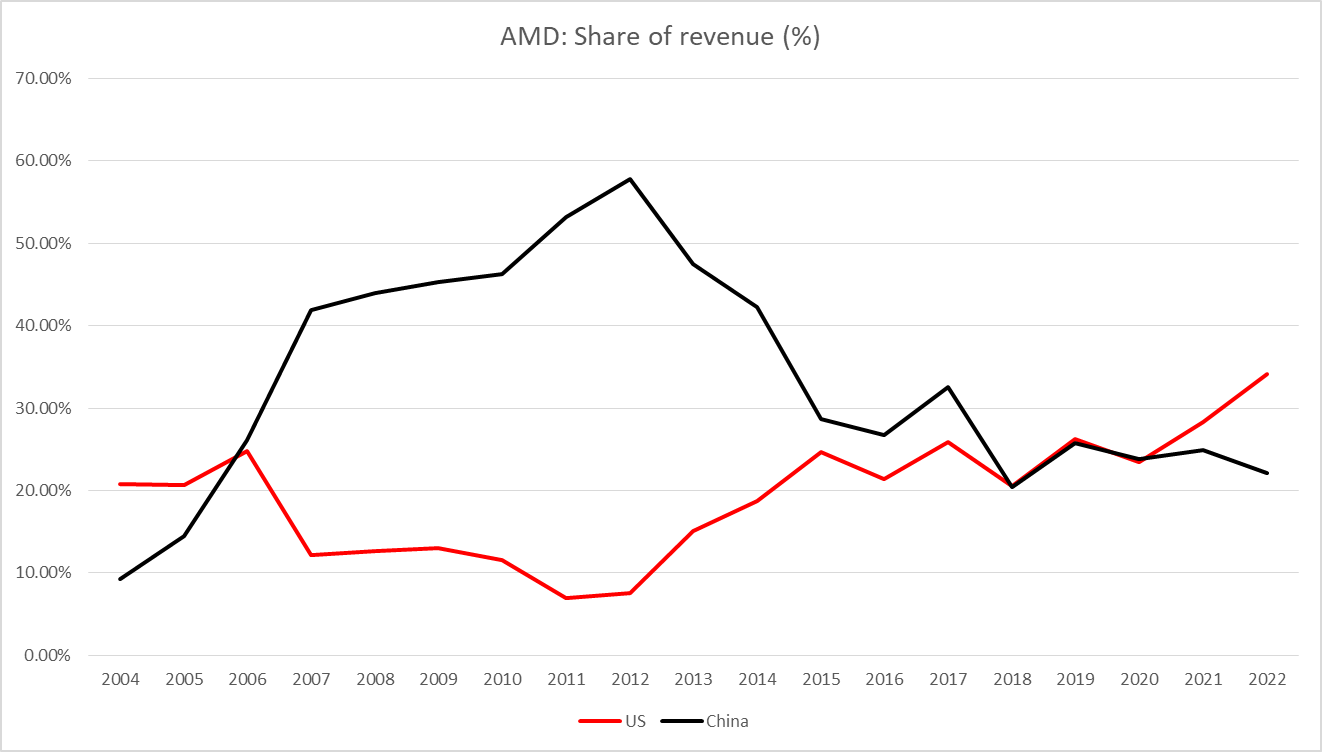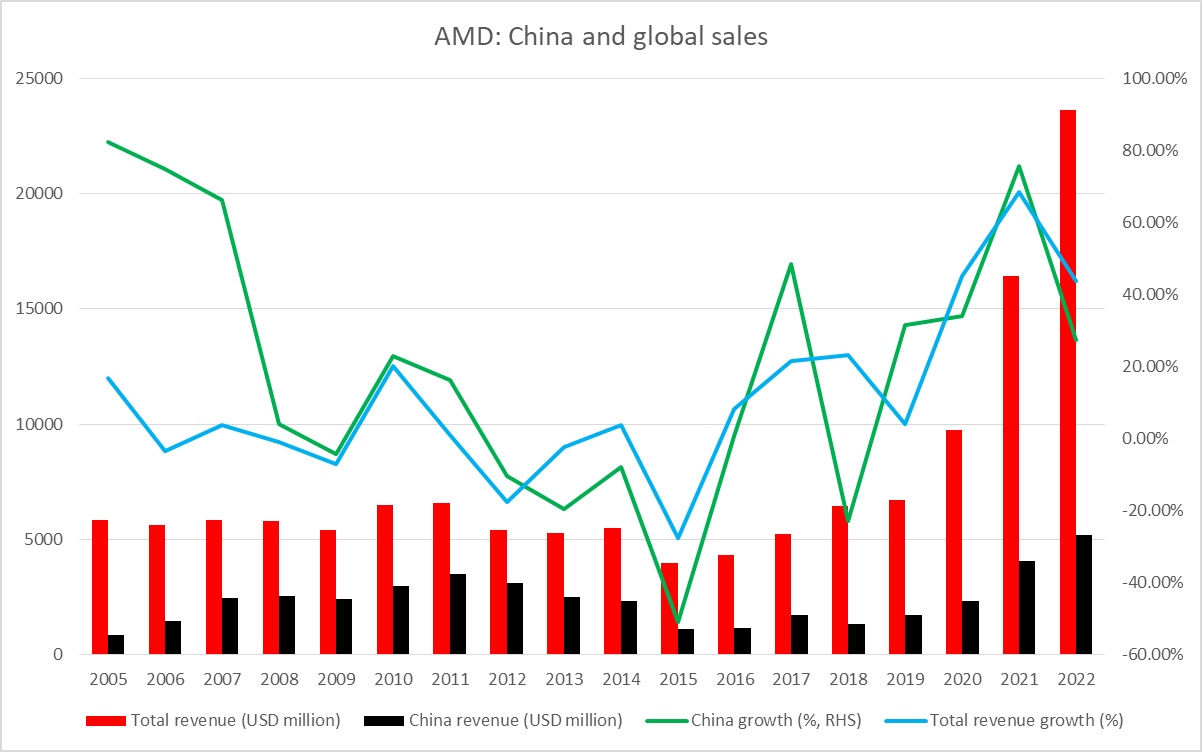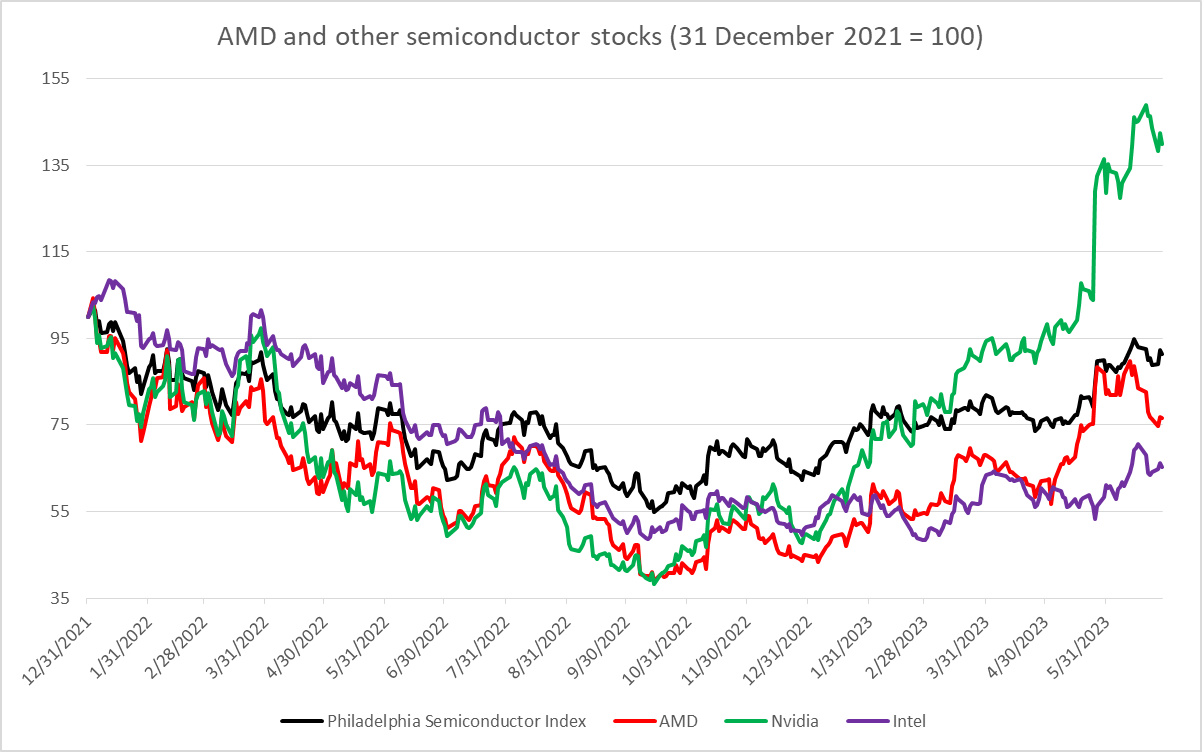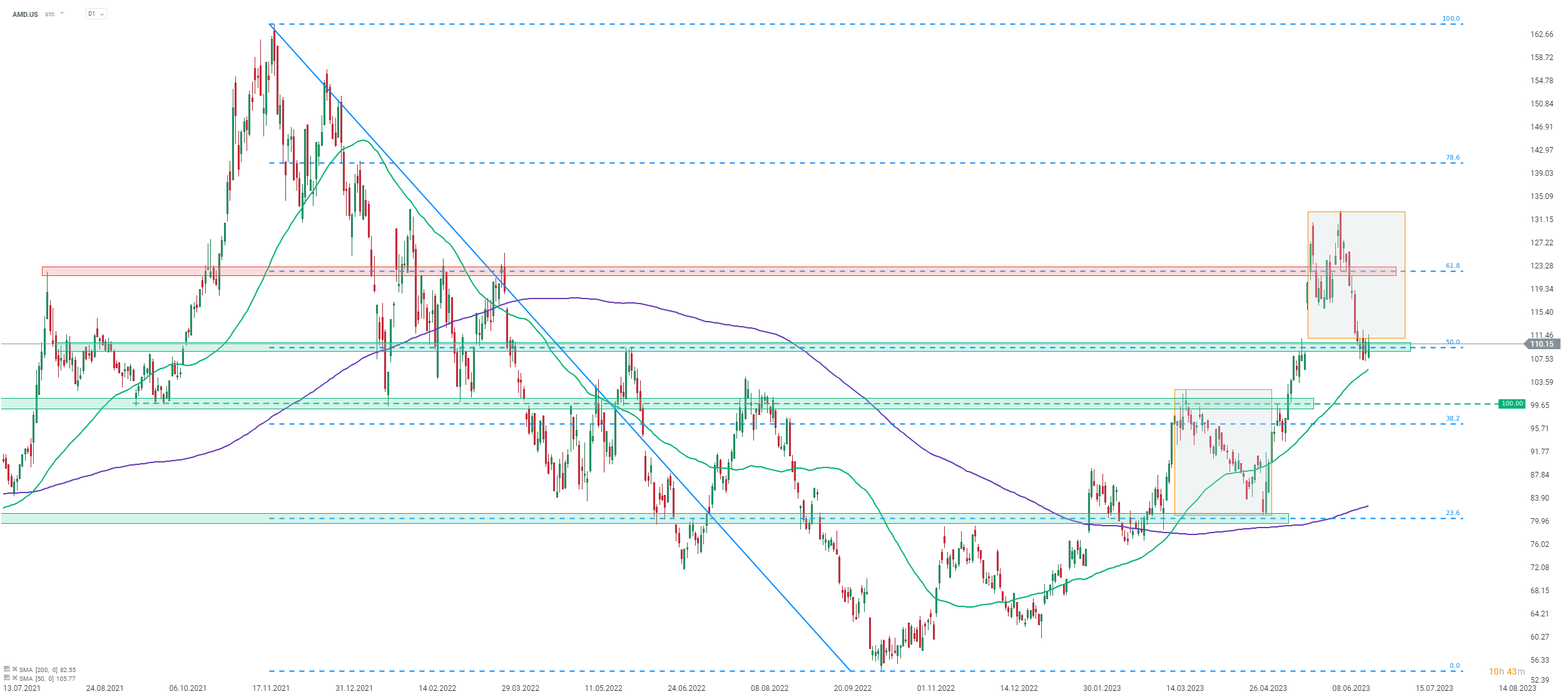- US semiconductor stocks dropped on reports of tougher export restrictions to China
- AMD and Nvidia among exposed stocks
- Impact on AMD's business may be limited however
- China is no longer driver of AMD growth
- Company has significantly reduced reliance on China over the past decade
- Stocks halts sell-off at 50% retracement
US semiconductor companies took a hit this week after Wall Street Journal hinted that new restrictions on chip sales to China may be coming. Advanced Micro Devices (AMD.US) was one of the stocks negatively impacted by the news but the impact of new measures on the company's business may be limited. Let's take a closer look at the situation of AMD!
US considers new restrictions on China
Wall Street Journal came out with a report on Tuesday evening saying that a group of US lawmakers wants to tighten restrictions on chip exports to China further. According to WSJ, new restrictions would target AI chips in an attempt to prevent China from using them in weapons development or hacking. Nvidia and Advanced Micro Devices are leaders in the industry when it comes to AI chips therefore the ban was seen as a threat to the results of the two companies. Nvidia has developed a less-capable AI chip earlier this year that would be allowed to be exported to China under current restrictions after obtaining a license from the US Department of Commerce. However, WSJ claims that new law would prevent even those lower-powered chips from being sold to China and that it could be adopted as soon as next month. However, new measures may not have as much impact on AMD as some fear.
 While China is an important market for semiconductor companies, AMD managed to decrease China's share of revenue in its total revenue from almost 60% in 2012 to below 25% in 2022. Source: Bloomberg, XTB
While China is an important market for semiconductor companies, AMD managed to decrease China's share of revenue in its total revenue from almost 60% in 2012 to below 25% in 2022. Source: Bloomberg, XTB
China no longer a driver of AMD business
As we have already said in the previous section, new measures against China are seen as indirectly targeting Nvidia and AMD as the two companies are leaders in so-called data center accelerator chips used in AI. However, Nvidia has an over-80% share in the market for these chips therefore negative impact of those measures will likely be better seen in Nvidia's results. China has been an important driver of AMD sales but this began to change in 2012 as the share of China in AMD's total revenue began to drop noticeably. Moreover, China is no longer the fastest growing market for AMD with sales growth in the country slowing below global sales growth in 2022 again.
 Not only China's share in AMD revenue has been dropping but also sales growth in the country slowed below total revenue growth of the company in 2022. Source: Bloomberg, XTB
Not only China's share in AMD revenue has been dropping but also sales growth in the country slowed below total revenue growth of the company in 2022. Source: Bloomberg, XTB
Impact depends on quality of sanctions enforcement
Impact of new US measures, if implemented, may be limited when it comes to AMD's business. While the company generated around 22% of its sales from China in 2022, those were not only sales of AI chips. Moreover, it should be said that effectiveness of the ban would depend on the quality of enforcement. China has proved to be creative when it comes to circumventing sanctions therefore any new ban would likely see Chinese companies attempting to source chips from third party countries, instead of directly from US chipmakers. As alternatives to Nvidia and AMD chips are scarce, this means that sales of AI chips from those companies that are made to China would likely switch direction rather than disappear completely.
AMD gains lag Nvidia's rally
Companies involved in Artificial Intelligence enjoyed a strong rally this year. Nvidia is an unquestionable leader when it comes to AI chips right now and this outperformance is clearly pictured by share price - stock is trading around 180% year-to-date higher. However, AMD also performed strongly so far this year and is trading 70% YTD higher, outpacing a 42.5% YTD gain made by Philadelphia Semiconductor Index and 27% YTD gain of Intel.
Nevertheless, it should be noted that Nvidia is the only one of the mentioned stocks that has managed to fully recover from the 2022 sell-off. AMD continues to trade around 23% below end-2021 levels while Intel trades 35% lower compared to December 31, 2021.
 While Nvidia has fully recovered from a 2022 sell-off already, AMD and Intel continue to trade below end-2021 levels. Source: Bloomberg
While Nvidia has fully recovered from a 2022 sell-off already, AMD and Intel continue to trade below end-2021 levels. Source: Bloomberg
A look at the chart
Shares of Advanced Micro Devices (AMD.US) launched yesterday's trading lower in response to Wall Street Journal report on new US chip export restrictions on China being considered. However, declines were erased during the Wall Street cash trading session and the stock finished the day slightly higher. Taking a look at the chart at D1 interval, we can see that the situation is not clear.
Stock has recently dropped below the lower limit of the market geometry which, according to the Overbalance methodology, hints at a bearish trend reversal. Nevertheless, declines were halted slightly below this hurdle in the $110 support zone, marked with previous price reactions and the 50% retracement of the downward move launched in December 2022. Stock is trading around 2% higher in premarket today so we may see an attempt to bounce off the $110 area today and recover part of recent losses. In such a scenario, the first resistance zone to watch can be found in the $122.50 area, marked with 61.8% retracement.
 Source: xStation5
Source: xStation5

Reggeli összefoglaló: Az Nvidia ragyogó eredményei lehúzzák a piacot

Gyorsjelentési szezon az XTB-vel

Live Trading - 2026.02.24.

Talpra Tréder - 2026.2.23.
Ezen tartalmat az XTB S.A. készítette, amelynek székhelye Varsóban található a következő címen, Prosta 67, 00-838 Varsó, Lengyelország (KRS szám: 0000217580), és a lengyel pénzügyi hatóság (KNF) felügyeli (sz. DDM-M-4021-57-1/2005). Ezen tartalom a 2014/65/EU irányelvének, ami az Európai Parlament és a Tanács 2014. május 15-i határozata a pénzügyi eszközök piacairól , 24. cikkének (3) bekezdése , valamint a 2002/92 / EK irányelv és a 2011/61 / EU irányelv (MiFID II) szerint marketingkommunikációnak minősül, továbbá nem minősül befektetési tanácsadásnak vagy befektetési kutatásnak. A marketingkommunikáció nem befektetési ajánlás vagy információ, amely befektetési stratégiát javasol a következő rendeleteknek megfelelően, Az Európai Parlament és a Tanács 596/2014 / EU rendelete (2014. április 16.) a piaci visszaélésekről (a piaci visszaélésekről szóló rendelet), valamint a 2003/6 / EK európai parlamenti és tanácsi irányelv és a 2003/124 / EK bizottsági irányelvek hatályon kívül helyezéséről / EK, 2003/125 / EK és 2004/72 / EK, valamint az (EU) 2016/958 bizottsági felhatalmazáson alapuló rendelet (2016. március 9.) az 596/2014 / EU európai parlamenti és tanácsi rendeletnek a szabályozási technikai szabályozás tekintetében történő kiegészítéséről a befektetési ajánlások vagy a befektetési stratégiát javasló vagy javasló egyéb információk objektív bemutatására, valamint az egyes érdekek vagy összeférhetetlenség utáni jelek nyilvánosságra hozatalának technikai szabályaira vonatkozó szabványok vagy egyéb tanácsadás, ideértve a befektetési tanácsadást is, az A pénzügyi eszközök kereskedelméről szóló, 2005. július 29-i törvény (azaz a 2019. évi Lap, módosított 875 tétel). Ezen marketingkommunikáció a legnagyobb gondossággal, tárgyilagossággal készült, bemutatja azokat a tényeket, amelyek a szerző számára a készítés időpontjában ismertek voltak , valamint mindenféle értékelési elemtől mentes. A marketingkommunikáció az Ügyfél igényeinek, az egyéni pénzügyi helyzetének figyelembevétele nélkül készül, és semmilyen módon nem terjeszt elő befektetési stratégiát. A marketingkommunikáció nem minősül semmilyen pénzügyi eszköz eladási, felajánlási, feliratkozási, vásárlási felhívásának, hirdetésének vagy promóciójának. Az XTB S.A. nem vállal felelősséget az Ügyfél ezen marketingkommunikációban foglalt információk alapján tett cselekedeteiért vagy mulasztásaiért, különösen a pénzügyi eszközök megszerzéséért vagy elidegenítéséért. Abban az esetben, ha a marketingkommunikáció bármilyen információt tartalmaz az abban megjelölt pénzügyi eszközökkel kapcsolatos eredményekről, azok nem jelentenek garanciát vagy előrejelzést a jövőbeli eredményekkel kapcsolatban.


